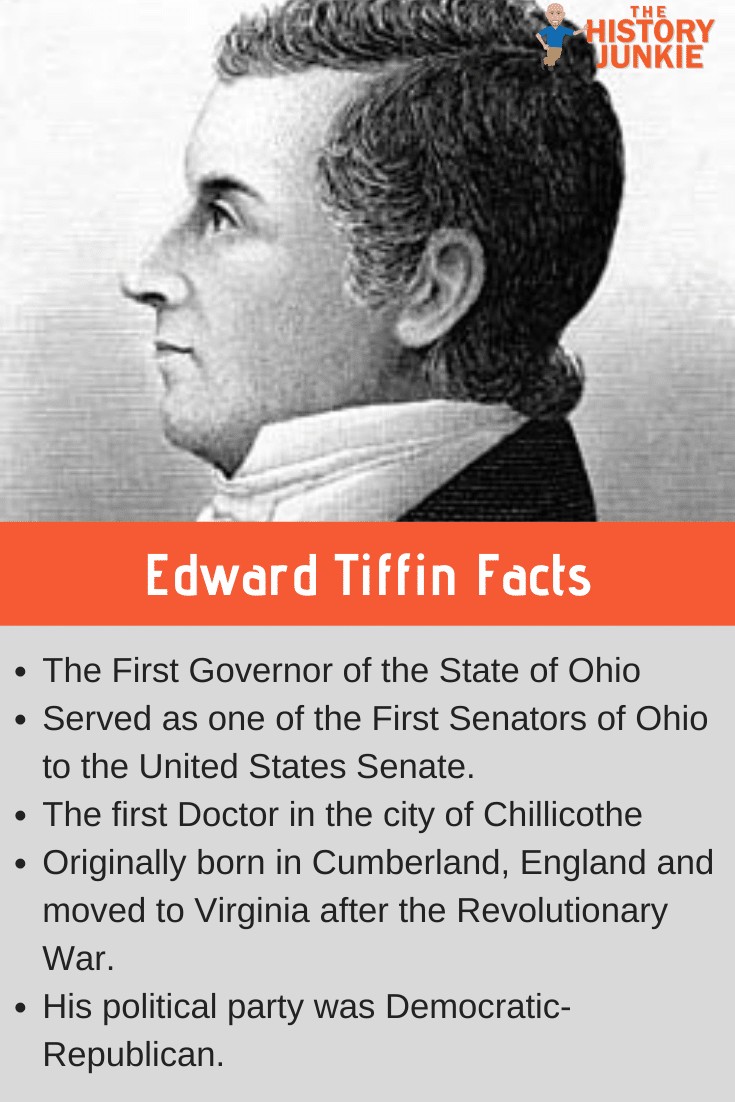Edward Tiffin was the first official Governor of Ohio and was a member of the Democratic-Republican party, which at the time dominated the political landscape. At the time he became the Governor of Ohio, the President of the United States was Thomas Jefferson.

He would serve as Governor for almost two terms and then be elected to serve as one of the first Senators from Ohio.
Tiffin would be an influential figure in Ohio politics during its early years.
Jump to:
Early Years
Edward Tiffin was born in 1766 in Cumberland, England. His family migrated to America after the Revolutionary War ended in 1783 and settled in Virginia, where he began practicing medicine at the young age of 17.
Despite not being a native-born American, he seemed to embrace the ideas of America and became a successful doctor within the area.
In 1789, he met and married Mary Worthington, the sister of future Governor of Ohio Thomas Worthington.
Mary's father died in 1798, and the couple inherited 16 slaves. The couple decided to free them and move to the Northwest Territory. The Northwest Territory had already banned slavery from existing within its borders.
However, Tiffin, a native of England, did not look favorably on slavery. However, he did not believe that blacks should have equal rights.
The couple would arrive and settle in Chillicothe, Ohio.
The two have a lovely marriage and served in the local Methodist church (Tiffin was ordained as a deacon in 1792, which allowed him to preach) but never had children. Mary Tiffin would die in 1808, ending a 19-year marriage.
She lived long enough to see her husband serve as Governor and Senator.
Life in Ohio
Ohio was not a state when Tiffin moved from Virginia. It was still part of the Northwest Territory, but it was quickly growing and, by 1803, had achieved statehood.
Tiffin became the first doctor in Chillicothe, traveling on horseback, day and night, to treat the afflicted. He arrived with a letter addressed to the governor of the Northwest Territory, Arthur St. Clair, from George Washington, recommending him for public office.
Tiffin served as the Speaker of the Territorial House of Representatives from 1799–1801 and as president of the 1802 Constitutional Convention, where he cast a tie-breaking vote to deny the voting franchise to the new state's 337 African-American residents.
He was a leader of the Chillicothe Junto, a group of Chillicothe Democratic-Republican politicians who brought about the admission of Ohio as a state in 1803 and largely controlled its politics for some years thereafter.
Among his colleagues in the faction were Thomas Worthington and Nathaniel Massie.
Tiffin was the obvious choice for the governorship when Ohio was admitted to the Union. He was elected almost without opposition to a first term and re-elected by similarly overwhelming numbers two years later. Tiffin acted promptly to stop the Burr conspiracy in his second term.
Tiffin was elected to the U.S. Senate in 1806 and resigned the governorship in March 1807 to take his seat. He served only two years, however, resigning after the death of his wife.
He was known for his steadfast resolve and dedication to the settlers who were pushing west to settle the land. Although Ohio had reached statehood, there were many Native American tribes that occupied much of its land, and he would have to navigate the state's development while dealing with some complicated diplomatic situations.
He procured an appropriation of public money for the improvement of the Ohio River. He secured better and speedier transportation of the mail, a better and more rapid system for the surveys of western lands, and urged such modifications of the laws regarding sales of western land.
He also voted for the expulsion of the other Ohio Senator, John Smith, who had been implicated in the Burr Conspiracy.
He spent only a few months at home, however, before being elected to the Ohio House of Representatives, where he served as speaker from 1809–11.
Tiffin remarried on April 16, 1809, to Mary Porter, originally from Delaware and then of Ross County. Tiffin became the first commissioner of the General Land Office, which managed allocations of Federal lands.
He quickly helped remove the Federal records from Washington before it was sacked during the War of 1812. In 1814, he became the Surveyor General of the Northwest Territory, exchanging positions with Josiah Meigs so that he might spend more time near his home in Chillicothe.
Tiffin served in the post until his death. The city of Tiffin and Tiffin University were named in honor of him.

